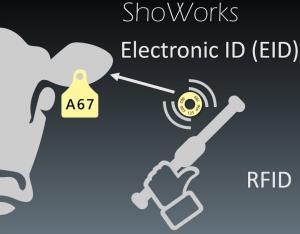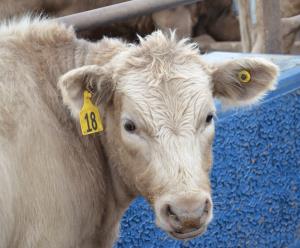 Control of bovine diseases in the U.S. and compliance with trade restrictions require positive identification of individual animals to establish a history of movement, vaccination status, age and location. The USDA Animal Plant Health Inspection Service previously announced that RFID electronic ear-tags as used in the EU will be introduced to the U.S. and will be required for interstate movement.
Control of bovine diseases in the U.S. and compliance with trade restrictions require positive identification of individual animals to establish a history of movement, vaccination status, age and location. The USDA Animal Plant Health Inspection Service previously announced that RFID electronic ear-tags as used in the EU will be introduced to the U.S. and will be required for interstate movement.
In comments filed with USDA on the proposal, the U.S. Cattlemen’s Association (USCA) accepted the principle of identification for the purpose of traceback stating, “Knowing where diseased and at-risk exposed animals are as well as were they have been and when, it is indispensible to emergency response and ongoing disease control and eradication programs.”
In contrast R-CALF USA is strenuously opposed to RFID tags and advocates retention of metal numeric ear tags. This is consistent with the 1900s approach of the organization that hearkens back to the freedom of the Wild West. Metal tags are impermanent and can be changed at will. R-CALF maintains that there is a hidden mandate in the APHIS proposal and they have objected to registration of farms as a prerequisite for shipping cattle interstate.
 The National Cattlemen’s Beef Association filed comments supporting RFID traceability enabling the industry, federal and state regulators to respond rapidly to any animal health emergency.
The National Cattlemen’s Beef Association filed comments supporting RFID traceability enabling the industry, federal and state regulators to respond rapidly to any animal health emergency.
The U.S. Cattlemen’s Association provided a number of suggestions that they would like to be incorporated into the APHIS program due to take effect on January 1st 2023. Security is obviously an issue and USCA requested that databases should be held in-state and only shared with the USDA as required. The USCA suggested that 840-series EID tags should be used reflecting cattle born and raised in the U.S. It was recommended that metal and electronic tags should continue parallel with metal tags as the industry adapts to an electronic system. USCA requested that identification numbers for farm premises should not be required to obtain EID tags.
The FSIS has awarded contracts for up to eight million low-frequency RFID ear tags with provision for additional purchases over the following five years. Greg Ibach, USDA Undersecretary for Marketing and Regulatory Programs stated, “USDA continues its commitment to protecting our nation’s animal agriculture by increasing traceability in the cattle and bison sectors – in this case, by providing free RFID tags to interested producers. Since 2018 the U.S. beef industry has cooperated with APHIS operating RFID systems in pilot programs in Kansas, Florida and Texas.
The Final Rule will take effect in January 2022 when USDA would no longer approve of metal ear tags with the official USDA shield. The following year RFID tags would become the only identification devices approved as an official means of identification for cattle.
Opposition to RFID or an alternative electronic identification system mounted by the Montana based R-CALF USA is regarded as retrograde and inconsistent with the needs of the U.S. cattle industry with respect to trade and the control of any future emerging disease.